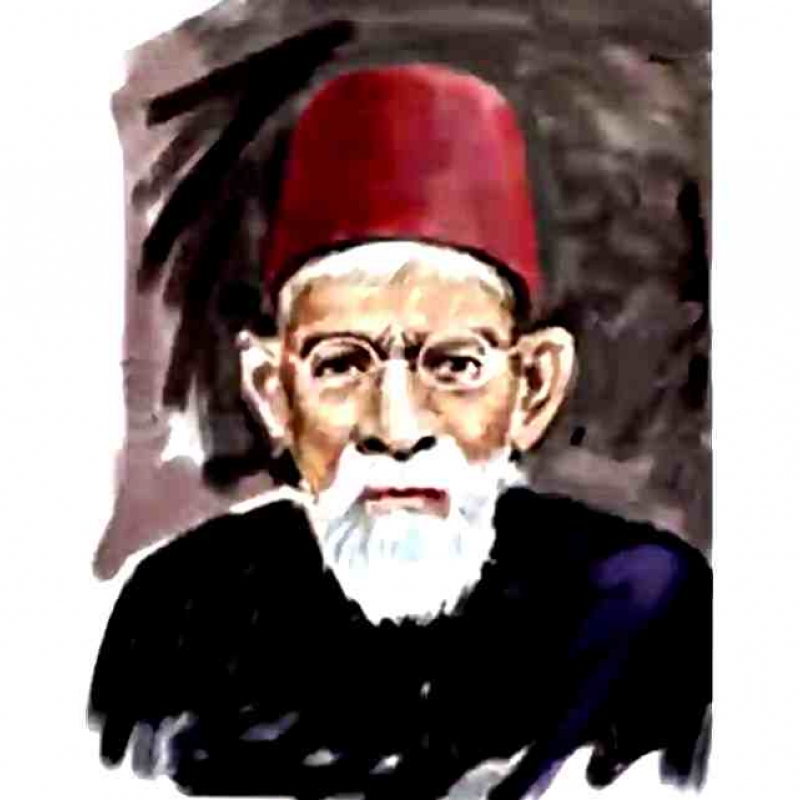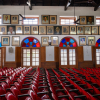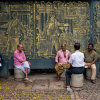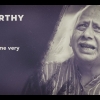Rightly called ‘Voice of the Times’, Akbar Allahabadi was one of Urdu language’s premiere political satirist in Hindustan. His words spared neither the British nor Indians who supported the Raj. He pre-empted the existence of Hinglish as a colloquial language, and injected his poetry with just the right dose. We look back at some of his nazms and shers that unearthed the sham of colonial rule in India while many extolled the benefits of a colonial governance. (Photo courtesy: Livemint via Twitter)
Qaum ke ġham meñ dinner khāte haiñ hukkām ke saath
rañj leader ko bahut hai magar ārām ke saath[1]
(Our leaders, in pain for the nation,
Are guest of the rulers for dinner;
In their suffering situation,
It’s strange they’re not looking thinner.)[2]
(Translated by Margaret H. Case)
The beginning of the nineteenth century in India was a time of flux for the Muslim community. After the Revolt of 1857, Muslims, in particular, had been the subject of attack by the British rulers. Many were forced to abandon Delhi and others not allowed to enter the city. In the wake of this crisis, the community adopted two opposing ideologies. While one group was staunchly hostile towards the British, the other saw a benefit in collaborating with the benefactors.
The latter—called supporters of the ‘new light’—believed in adopting British culture as modern. This had Urdu poet and satirist Akbar Allahabadi (1846–1921) bothered, as he lamented the loss of culture that would come with imitation of the British way of life. He took to his trusted weapon—satirical poetry—to critique this trend.
Deed ki kabil ab us ullu ka fakhr-o-naaz hai
jisse maghrib ne kaha tu honorary baaz hai[3]
(Look at the owl! What airs and graces! What a way to talk!
Because the British told him he’s an honorary hawk!)[4]
(Translated by Ralph Russell)
Punning on the same word for owl and a fool, Allahbadi rebukes those who blindly followed the British and sought their approval. Not opposed to modernity and change, Allahabadi opposed the ‘New Light’ concept. The way he saw it, British modernity came with materialism, communal tension, over-regulation, etc.[5] For him, progress was just another British tactic that ensured loyalty and control over Hindustan. His writing pulled no punches in pointing towards that.
Their main object is to trap the lions of the East,
Some buffaloes have just been tied as baits in the name of progress.[6]
(Translated by Iqbal Hussain)
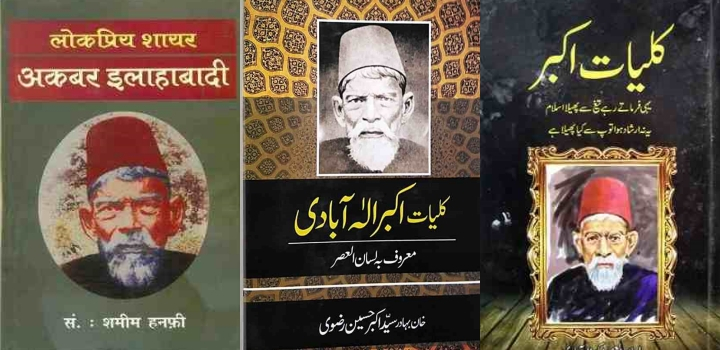
Urdu scholar and translator, Prof. Shamsur Rahman Faruqi counted Allahabadi among the first of the postcolonial writers in India.[7] At a time when people had started looking towards the West for direction, Allahabadi did not see much that was impressive there. Many, for instance, regarded the introduction of English education as one of the boons of British rule in India. Allahabadi did not agree. Instead, he mocked Western education in his writing. However, it is interesting to see how he liberally used English words in his Urdu couplets to drive home the point. This aspect would probably resonate with Generation Z poets and writers who often use a similar language style.
Also read | Avtar Singh Sandhu (Pash): Life and Works of a Revolutionary Poet
Kyunkar khuda ke arsh mein kaayal hon yeh azeez?
jugraafiye mein arsh ka naksha nahin milta[8]
(Poor fellows, how can they believe that there’s a throne of God?
It wasn’t on the maps they studied in geography)[9]
(Translated by Ralph Russell)
In the following sher (a pair of verse lines), he questions the value of such education which would give no real meaning to life.
Ham kyā kaheñ ahbāb kyā kār-e-numāyāñ kar ga.e
B.A hue naukar hue pension milī phir mar ga.e [10]
(What words of mine can tell the deeds of men like these, our nations pride?
They got their B.A., took employment drew their pensions and then died.)[11]
(Translated by Ralph Russell)
Iqbal Husain characterises Allahabadi as a nationalist poet.[12] This epithet is interesting considering that the poet was a District Court judge, and therefore, a British benefactor.[13] Despite being a sarkari naukar (government employee), he had little hesitation about documenting the social change brought forth by colonial rule. Writing in the backdrop of a brewing Hindi-Urdu controversy over the national language of Hindustan, he addressed both the colonial economic exploitation and communal politics at play during the time.
Ye baat ġhalat ki dār-ul-islām hai hind
ye jhuut ki mulk-e-'lachhman'-o-'rām' hai hind
ham sab haiñ mutī-o-ḳhair-ḳhvāh-e-english
europe ke liye bas ek godām hai hind [14]
(It is wrong to say that India is the land of Islam,
It is false to say that India is the country of Lakshman and Ram,All of us are the subjects and well-wishers of the English,
What is India, but a godown for Europe?)[15](Translated by Iqbal Hussain)
Also read | Alternative Poetry of the Northeast
Allahabadi equated British modernity with loss and enslavement. He favoured the Swadeshi movement, which emphasised self-reliance and promoted indigenous alternatives to colonial products. He regarded Swadeshi as a moment of celebration precisely for this.
O Akbar, I am in ecstasy at the Swadeshi Movement,
What a beautiful song is being sung to the tune of the country.[16](Translated by Iqbal Hussain)
Allahabadi was also aware of the economic exploitation that came with British rule. His most bitter attack on colonialism came during the Delhi Durbar of 1911. The Durbar with all its splendour was seen as a waste of money, especially when resentment towards colonial rule was becoming palpable among Indians. Allahabadi attacked the hypocrisy of Indian participants in this nazm.
Jaame se bāhar nigāh-e-nāz-e-fattāhān-e-hind
hadd-e-qānūnī ke andar honorabloñ kī qatār
ḳharch kā total diloñ meñ chutkiyāñ letā huā
fikr-e-zātī meñ ḳhayāl-e-qaum ġhā.eb fil-mazār [17]
(The Conquerors of India were seething with limitless pride,
While the 'honourables' were lined up according to fixed ranks
Only the thoughts of their hotel expenses were troubling their hearts,
Immersed in personal worries, forgetting the nation's cause.)[18]
(Translated by Iqbal Hussain)
At the beginning of the twentieth century, nationalist movements were just building their ground in the fight for independence. The Montagu-Chelmsford reforms, enacted in 1919, reassured Indians that they would be allowed to self-govern with some form of British supervision in the future. Allahabadi saw this talk of Swarajya as an empty promise.
A brother is locked in fight with brother,
“Self-Government” has arrived.[19]
(Translated by Iqbal Hussain)
This sentiment is also echoed in the lines he penned down after the Non-cooperation and Khilafat movements of the 1920s in his collection Gandhi Nama. In their aftermath, only a certain class of nationalist leaders, except for Gandhi, were sent to jail. Allahabadi saw this as a British bid to fuel division between the Khilafatists and Congress which would ultimately only benefit the British.
Also read | Kuravanjis in Contemporary Theatre: In Conversation with A. Mangai
Poochta hoon, “aap Gandhi ko pakadte kyun nahin?”
kehte hain, “aapas hi mein tum log ladte kyun nahin?”
pech kishmat ke tumhare jab dikhayenge kaji
aadelana rang mein uth kar karenge hum jaji[20]
(I ask, “Why don't you arrest Gandhi?”
They say, “Why don't you quarrel among ourselves?”
When your fortune takes an evil turn,Then we would adopt a judicious mien and act as the judge.)[21]
(Translated by Iqbal Hussain)
Allahabadi died in 1921, decades before the British were ousted from the country. But in these lines, he could foreshadow the situation that would develop in India during the 1940s. Acting as the final arbiters, the British would crudely partition the country in response to growing religious tensions.
Akbar Allahabadi lived up to his title, Lisan-ul-Asr or the Voice of the Times. In a few words of poetry, Allahabdi managed to unearth the sham of colonial rule in India. He used humour and satire to convey his message and at a time when many in his society saw a benefit in gaining favours from the British, he criticised unthoughtful imitation and remained extremely attached to indigenous culture.
This article was also published on Livemint.com.
Notes
[1] Akbar Allahabdi, ‘Qaum ke gham mein dinner khate hain hukkaam ke sath’, Rekhta, accessed February 6, 2021, https://rekhta.org/couplets/qaum-ke-gam-men-dinner-khaate-hain-hukkaam-ke-saath-akbar-allahabadi-couplets.
[2] Margaret H. Case, ‘The Social and Political Satire of Akbar Allahabadi, (1846- 1921),’ Mahfil 1, no. 4 (1964): 18.
[3] Veerendra Kumar Baranwal, Muslim Navjagaran aur Akbar Illahabadi ka ‘Gandhinama’ (New Delhi, Rajkamal Prakashan, 2018), 244.
[4] Ralph Russell and Marion Molteno, A Thousand Yearnings: A Book of Urdu Poetry and Prose (New Delhi, Speaking Tiger, 2017), 316.
[5] Shamsur Rahman Faruqi, ‘The Power Politics of Culture: Akbar Ilahabadi and the Changing Order of Things’ (Paper presented as the fourteenth Zakir Husain Memorial Lecture, at Zakir Husain College, New Delhi, January 2002, http://www.columbia.akadns.net/itc/mealac/pritchett/00fwp/srf/srf_akbar_ilahabadi.pdf, 23).
[6] Iqbal Husain, ‘Akbar Allahabadi and National Politics,’ Social Scientist 16, no. 5 (May 1998), 38.
[7] Shamsur Rahman Faruqi, ‘The Power Politics of Culture: Akbar Ilahabadi and the Changing Order of Things’ (Paper presented as the fourteenth Zakir Husain Memorial Lecture, at Zakir Husain College, New Delhi, January 2002, http://www.columbia.akadns.net/itc/mealac/pritchett/00fwp/srf/srf_akbar_ilahabadi.pdf, 22.
[8] Veerendra Kumar Baranwal, Muslim Navjagaran aur Akbar Illahabadi ka ‘Gandhinama’, 293.
[9] Ralph Russell and Marion Molteno, A Thousand Yearnings: A Book of Urdu Poetry and Prose (New Delhi, Speaking Tiger, 2017), 314.
[10] Akbar Allahabadi, ‘hum kya kahen ahbab kya kar-e-numayan kar gae,’ Rekhta, accessed January 28, 2021, https://www.rekhta.org/couplets/ham-kyaa-kahen-ahbaab-kyaa-kaar-e-numaayaan-kar-gae-akbar-allahabadi-couplets.
[11] Ralph Russell and Marion Molteno, A Thousand Yearnings: A Book of Urdu Poetry and Prose (New Delhi, Speaking Tiger, 2017), 316.
[12] Iqbal Husain, ‘Akbar Allahabadi and National Politics,’ Social Scientist 16, no. 5 (May 1998).
[13] Shamsur Rahman Faruqi, ‘The Power Politics of Culture: Akbar Ilahabadi and the Changing Order of Things’ (Paper presented as the fourteenth Zakir Husain Memorial Lecture, at Zakir Husain College, New Delhi, January 2002, http://www.columbia.akadns.net/itc/mealac/pritchett/00fwp/srf/srf_akbar_ilahabadi.pdf, 2).
[14] Akbar Allahabadi, ‘Ye baat ghalat ki dar-ul-islam hai hind,’ Rekhta, accessed February 10, 2021, https://www.rekhta.org/rubaai/ye-baat-galat-ki-daar-ul-islaam-hai-hind-akbar-allahabadi-rubaai.
[15] Iqbal Husain, ‘Akbar Allahabadi and National Politics,’ Social Scientist 16, no. 5 (May 1998), 31.
[16] Ibid., 35.
[17] Rekhta, “Darbar1911”, Rekhta. Accessed January 28, 2021. https://www.rekhta.org/nazms/darbaar1911-akbar-allahabadi-nazms.
[18] Iqbal Husain, ‘Akbar Allahabadi and National Politics’, Social Scientist, Vol. 16, No. 5 (May 1998), 37.
[19] Ibid., 39.
[20] Akbar Allahabadi, Gandhinama, ed. Dr Fakhrul Karim, trans. Dr Abdul Mohyi (Allahabad: Hindustani Academy), 148.
[21] Iqbal Husain, ‘Akbar Allahabadi and National Politics’, Social Scientist, Vol. 16, No. 5 (May 1998), 41.
